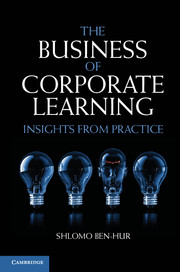Book contents
- Frontmatter
- Contents
- Figures
- Tables
- Acknowledgements
- 1 The weight of history
- 2 Creating a corporate learning strategy
- 3 Developing learning solutions
- 4 Delivering learning solutions
- 5 Resourcing learning solutions
- 6 Demonstrating the value of corporate learning
- 7 Branding corporate learning
- 8 Governing corporate learning
- 9 A way forward
- References
- Index
1 - The weight of history
An introduction
Published online by Cambridge University Press: 05 March 2013
- Frontmatter
- Contents
- Figures
- Tables
- Acknowledgements
- 1 The weight of history
- 2 Creating a corporate learning strategy
- 3 Developing learning solutions
- 4 Delivering learning solutions
- 5 Resourcing learning solutions
- 6 Demonstrating the value of corporate learning
- 7 Branding corporate learning
- 8 Governing corporate learning
- 9 A way forward
- References
- Index
Summary
The traditional way to begin a story or book, at least in many European languages, is with the phrase ‘once upon a time’. As starts go, it’s not a bad one. Yet in thinking about the first words of this book, it occurred to me that I couldn’t begin this way, as this opening is usually paired with the equally traditional ending of ‘… and they all lived happily ever after’. And quite frankly, I am not sure that corporate learning will.
This book, then, is about corporate learning and about what organisations need to do to make it work. Like so many stories, it is a tale of desire and frustration, of good intentions and misplaced actions. Whether it will be a tragedy or just a drama remains to be seen, but it begins with a crisis and, indeed, it is this crisis that makes me fervently believe that this tale needs telling.
In 2004 a well-publicised survey found that only 17 per cent of business leaders reported being ‘very satisfied’ with the performance of their learning functions. 1 In the intervening period, there has been no shortage of books, articles and opinions about how to rectify the situation. Yet nothing much seems to have changed because in early 2012 another survey found that more than half of line managers believe that employee performance would not change if the company’s learning function were eliminated. That is pretty damning. It would be nice if we could dismiss this as ‘just one survey’, but the reality is that over the past ten years research has repeatedly shown that the proportion of business leaders who report being satisfied with their learning function’s performance has steadfastly remained around 20 per cent.
- Type
- Chapter
- Information
- The Business of Corporate LearningInsights from Practice, pp. 1 - 13Publisher: Cambridge University PressPrint publication year: 2013



